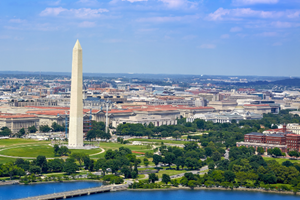Issues & Trends
What You Need to Know About the District’s Revised Ban on Non-Competes
July 26, 2022
On July 12, 2022, the D.C. Council passed the Non-Compete Clarification Amendment Act of 2022, which modifies the District of Columbia’s Ban on Non-Compete Agreements Amendment Act of 2020. Barring opposition from Congress or Mayor Muriel Bowser, the 2022 act takes effect on October 1 this year.
opposition from Congress or Mayor Muriel Bowser, the 2022 act takes effect on October 1 this year.
The 2020 law was one of the country’s broadest laws curtailing the use of non-compete agreements, essentially prohibiting all non-compete provisions in the District, with limited exceptions applicable to religious organizations, babysitters, and medical specialists only. Reeling back the scope, the revised ban introduced an income limitation, allowing non-compete agreements for employees whose total compensation is more than $150,000.
After Bowser signed the original act on January 11, 2021, it was met with a flurry of concerns from both employers and employees. To complicate matters more, the ban’s applicability date was postponed twice.
Most critics of the 2020 ban support the underlying policy rationale — D.C. employees should be able to find work without unnecessary restrictions. Specifically, employers were prohibited from (1) requiring or requesting an employee to sign a non-compete agreement; (2) having a workplace policy that prohibits an employee from simultaneous employment, including working for a direct competitor; and (3) retaliating or threatening to retaliate against an employee for refusing to sign, failing to comply with, or complaining or inquiring about a non-compete agreement.
However, critics argue that the law went too far. Many employers, such as those in the tech industry, are concerned that the ban would no longer prevent employees from jumping to a competitor with confidential or proprietary information. These employers say that limits on post-employment activity help protect companies’ sensitive and valuable information. On the other hand, proponents of the ban argue that such consequences are exaggerated. They argue that businesses already have federal and state tools (such as trade secrets regulations, non-disclosure agreements, and copyright protections) to prevent the disclosure or use of sensitive information, and the ban did not explicitly prohibit any of these existing protections. (For analysis on how the non-compete ban will impact legal employers in the District, read Alan Strasser’s “Taking the Stand” column in the July/August 2021 issue of Washington Lawyer.)
Critics also argue that non-competes are highly valuable in some industries, protecting real estate agencies, broadcasters, and professional sports teams whose employees are valuable largely because their services are not available to other competitors. Within higher education, tenured faculty have unique employment status. These employees benefit from nearly unlimited job security and limited oversight. In return, universities expect such faculty to fulfill their commitment to students and often have non-compete agreements to limit faculty association with other universities. The 2020 ban, however, allowed faculty to be simultaneously tenured at more than one university.
Given the concerns of the local business community, D.C. Councilmember Brooke Pinto introduced several amendments on July 14, 2021, to craft a more targeted non-compete ban so that employers could negotiate agreements with high-level employees. Pinto’s revisions are reflected in the 2022 clarification act.
Non-competes are now permitted for “highly compensated employee[s]” and medical specialists making $250,000 or more. The act clarifies that employers may still prohibit employees with broad access to confidential information from simultaneously working for a competitor or their own business where they are likely to use that information. Also, the revised ban modifies its controversial moonlighting provision, now permitting anti-moonlighting provisions if the employer reasonably believes that outside employment will (1) lead to disclosure or use of confidential or proprietary information; (2) conflict with the employer’s, industry’s, or profession’s established rules regarding conflicts of interest; (3) constitute a “conflict of commitment” for an employee of a higher education institution; and (4) impair the employer’s ability to comply with D.C. or federal laws or regulations or another contract.
For any eligible non-compete agreement, an employer now must provide any relevant provision in writing at least 14 days before the employee begins employment. The revised law maintains the status quo on broadcast employees — defined as on- or off-air content creators — so that a ban on non-competes for these employees may continue, regardless of total compensation. Last, the revised ban clarifies its scope to cover employees who spend a majority of their time working in the District, or employees with a D.C. employer who spend a “substantial amount” of time for that employer in the city.
Despite the new amendments seeking to alleviate the community’s concerns, the revised ban will likely continue to elicit criticism from its opponents as being too restrictive, and from its proponents as not being protective enough of workers’ rights.
Olive Lee is a third-year law student at The George Washington University Law School and a Karen Hastie Williams Leadership Fellow with the D.C. Bar.


